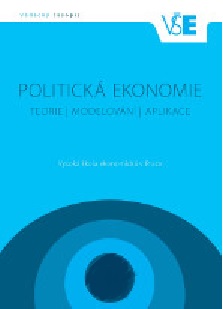Kontroverze konceptu minimální mzdy, aplikace na Českou republiku
Concept of Minimum Wage Controversy: The Case of the Czech Republic
Author(s): Helena Chytilová, Petr FrejlichSubject(s): Politics / Political Sciences, Micro-Economics, Socio-Economic Research
Published by: Vysoká škola ekonomická v Praze
Keywords: unemployment; minimum wage; Kaitz index; Cochrane-Orcutt estimation; minimumwage controversy; new economics of minimum wage
Summary/Abstract: The issue of minimum wage is highly topical in the context of the so-called minimum wage controversy, which contradicts the attitude of the neoclassical school. The aim of this paper is to analyse the effect of minimum wage increase together with effects of changes in other exogenous variables such as GDP growth rate, inflation rate, unemployment compensation and other social benefits on the real unemployment rate in the Czech Republic in 2006–2018. Linear regression models are tested using the Cochrane–Orcutt method. The effect of minimum wage increase on the rate of unemployment proved to be insignificant in the period 2006-2018. A negative effect of GDP growth rate was confirmed in 2006-2018, while unemployment benefits seemed to have a positive effect on the unemployment rate. The results show a negative effect of increasing minimum wage on the unemployment rate of women in 2011–2018, in line with the neoclassical theory. The conclusions of this paper have significant economic implications for minimum wage policy.
Journal: Politická ekonomie
- Issue Year: 68/2020
- Issue No: 4
- Page Range: 423-442
- Page Count: 20
- Language: Czech

